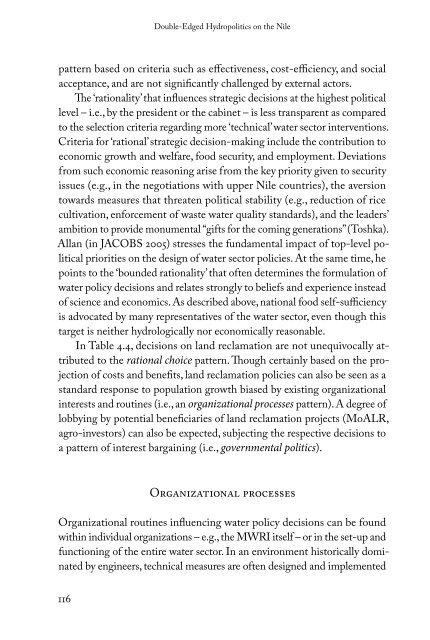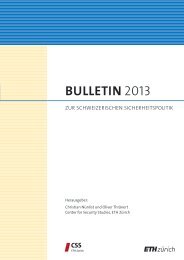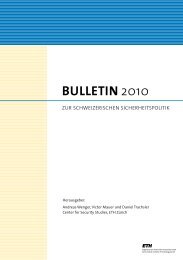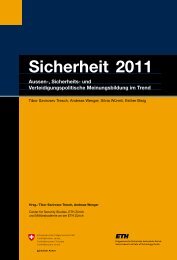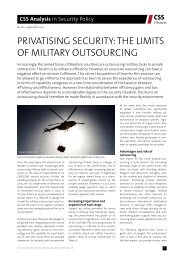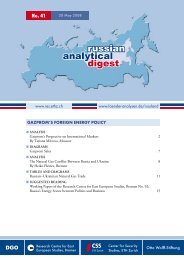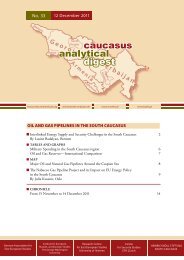Double-Edged Hydropolitics on the Nile - Center for Security Studies ...
Double-Edged Hydropolitics on the Nile - Center for Security Studies ...
Double-Edged Hydropolitics on the Nile - Center for Security Studies ...
Create successful ePaper yourself
Turn your PDF publications into a flip-book with our unique Google optimized e-Paper software.
<str<strong>on</strong>g>Double</str<strong>on</strong>g>-<str<strong>on</strong>g>Edged</str<strong>on</strong>g> <str<strong>on</strong>g>Hydropolitics</str<strong>on</strong>g> <strong>on</strong> <strong>the</strong> <strong>Nile</strong><br />
pattern based <strong>on</strong> criteria such as effectiveness, cost-efficiency, and social<br />
acceptance, and are not significantly challenged by external actors.<br />
The ‘rati<strong>on</strong>ality’ that influences strategic decisi<strong>on</strong>s at <strong>the</strong> highest political<br />
level – i.e., by <strong>the</strong> president or <strong>the</strong> cabinet – is less transparent as compared<br />
to <strong>the</strong> selecti<strong>on</strong> criteria regarding more ‘technical’ water sector interventi<strong>on</strong>s.<br />
Criteria <strong>for</strong> ‘rati<strong>on</strong>al’ strategic decisi<strong>on</strong>-making include <strong>the</strong> c<strong>on</strong>tributi<strong>on</strong> to<br />
ec<strong>on</strong>omic growth and welfare, food security, and employment. Deviati<strong>on</strong>s<br />
from such ec<strong>on</strong>omic reas<strong>on</strong>ing arise from <strong>the</strong> key priority given to security<br />
issues (e.g., in <strong>the</strong> negotiati<strong>on</strong>s with upper <strong>Nile</strong> countries), <strong>the</strong> aversi<strong>on</strong><br />
towards measures that threaten political stability (e.g., reducti<strong>on</strong> of rice<br />
cultivati<strong>on</strong>, en<strong>for</strong>cement of waste water quality standards), and <strong>the</strong> leaders’<br />
ambiti<strong>on</strong> to provide m<strong>on</strong>umental “gifts <strong>for</strong> <strong>the</strong> coming generati<strong>on</strong>s” (Toshka).<br />
Allan (in JACOBS 2005) stresses <strong>the</strong> fundamental impact of top-level political<br />
priorities <strong>on</strong> <strong>the</strong> design of water sector policies. At <strong>the</strong> same time, he<br />
points to <strong>the</strong> ‘bounded rati<strong>on</strong>ality’ that often determines <strong>the</strong> <strong>for</strong>mulati<strong>on</strong> of<br />
water policy decisi<strong>on</strong>s and relates str<strong>on</strong>gly to beliefs and experience instead<br />
of science and ec<strong>on</strong>omics. As described above, nati<strong>on</strong>al food self-sufficiency<br />
is advocated by many representatives of <strong>the</strong> water sector, even though this<br />
target is nei<strong>the</strong>r hydrologically nor ec<strong>on</strong>omically reas<strong>on</strong>able.<br />
In Table 4.4, decisi<strong>on</strong>s <strong>on</strong> land reclamati<strong>on</strong> are not unequivocally attributed<br />
to <strong>the</strong> rati<strong>on</strong>al choice pattern. Though certainly based <strong>on</strong> <strong>the</strong> projecti<strong>on</strong><br />
of costs and benefits, land reclamati<strong>on</strong> policies can also be seen as a<br />
standard resp<strong>on</strong>se to populati<strong>on</strong> growth biased by existing organizati<strong>on</strong>al<br />
interests and routines (i.e., an organizati<strong>on</strong>al processes pattern). A degree of<br />
lobbying by potential beneficiaries of land reclamati<strong>on</strong> projects (MoALR,<br />
agro-investors) can also be expected, subjecting <strong>the</strong> respective decisi<strong>on</strong>s to<br />
a pattern of interest bargaining (i.e., governmental politics).<br />
Organizati<strong>on</strong>al processes<br />
Organizati<strong>on</strong>al routines influencing water policy decisi<strong>on</strong>s can be found<br />
within individual organizati<strong>on</strong>s – e.g., <strong>the</strong> MWRI itself – or in <strong>the</strong> set-up and<br />
functi<strong>on</strong>ing of <strong>the</strong> entire water sector. In an envir<strong>on</strong>ment historically dominated<br />
by engineers, technical measures are often designed and implemented<br />
116


